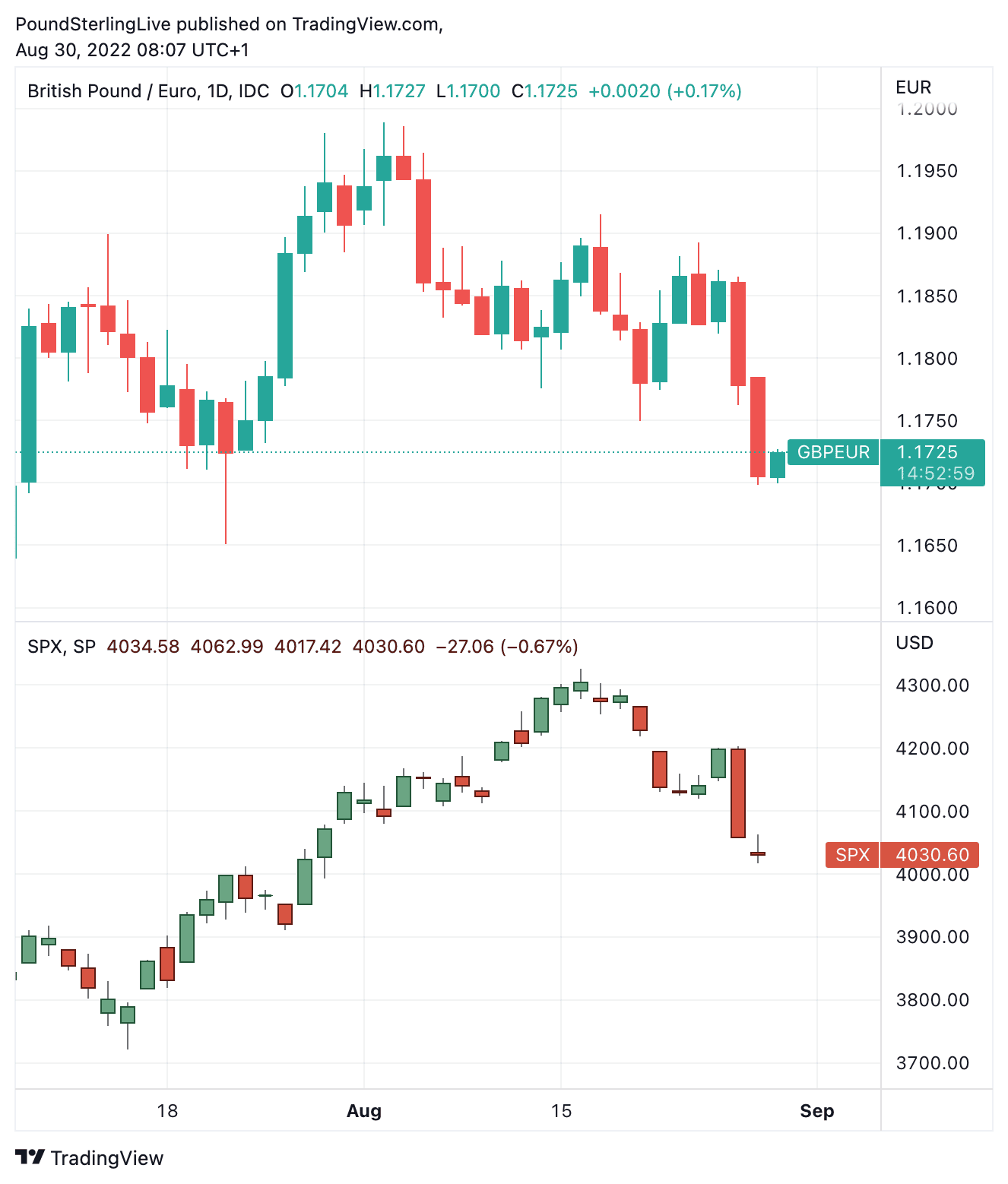Pound Sterling Under Pressure against Euro and Dollar as Markets Slump
- Written by: Gary Howes

Image © Adobe Images
The British Pound's sensitivity to global stock markets leaves it stuttering against both the Euro and Dollar and only a stabilisation in global market conditions will stop the losses.
The Pound has slumped sharply against both currencies over recent sessions as investors bail out of stocks in fear of further interest rate hikes at the U.S. Federal Reserve.
Federal Reserve Chair Jerome Powell on Friday sparked significant market moves when he said the Fed will do "whatever it takes" to bring inflation back to the 2.0% target, even as that may cause pain in terms of lower growth and higher unemployment.
Falls in global stocks followed Powell's comments made at the Jackson Hole symposium as investors feared a sharp contraction in global growth in response to searing rises in U.S. interest rates.
Powell was seen to be pushing back on a recent rally in U.S. stocks that was fuelled by speculation that policy makers would soon reverse course from their aggressive monetary tightening.
The Pound's sensitivity to global investor sentiment meant it was vulnerable to Powell's warnings.
"GBP has been heavily influenced by broader risk appetite this year," says Dominic Bunning, Head of European FX Research at HSBC, "equity movements are generally the dominant driver of GBP".
The S&P 500 tumbled 3.4% following the Powell speech, delivering its worst performance since mid-June, the Nasdaq 100 fell more than 4%.
"Sterling has been a little weaker than we thought, especially against the euro. Sterling typically shows higher correlations to equity markets than the euro (probably given the larger role of financial services in the UK economy). A tough environment for equities is therefore a real headwind to any sterling recovery," says Chris Turner Global Head of Markets and Regional Head of Research for UK & CEE at ING.
Above: GBP/EUR (top) and S&P 500 (bottom), highlighting the generalised relationship between Sterling and investor sentiment.
The Pound to Euro exchange rate fell a sizeable 0.70% on Friday and a further 0.60% on Monday, leaving it at 1.17 as UK markets return from a long weekend. Bank accounts are charging around 1.15 for dollar payments today, independent providers around 1.1690.
The Pound to Dollar exchange rate fell 0.80% on Friday and 0.30% on Monday, leaving it at 1.17. Bank accounts are charging around 1.15 for dollar payments today, independent providers around 1.1690 (exactly the same as GBP/EUR as EUR/USD is at parity).
"We think the path of least resistance for GBP/USD is down in the near term. GBP/USD has downside support at 1.1412, the low reached in early 2020 when the Covid pandemic first came in to play," says Kristina Clifton, FX strategist and economist at CBA.
"Activity resumes in London after the bank holiday yesterday, and month-end position adjustments are set to dominate the scene in the FX market today. EUR-USD is still struggling close to parity, which suggests that investors are probably waiting for more sensitive data and events later this week to take more directional positions," says Roberto Mialich, head of foreign exchange research at UniCredit Bank.
The Euro is meanwhile better supported against both the Pound and Dollar in recent sessions, thanks to signs the European Central Bank intends to hike interest rates sharply over coming months in response to surging inflation.
Eurozone money markets on Monday moved to price in a two-thirds chance of a large 75 basis-point rate hike at the ECB in September after policymakers made the case over the weekend for a large move to tame inflation four times above their target, reports Reuters.
Compare Currency Exchange Rates
Find out how much you could save on your international transfer
Estimated saving compared to high street banks:
£2,500.00
Free • No obligation • Takes 2 minutes
Furthermore, falling natural gas prices in the EU have also supported the single currency.
"Hawkish comments from ECB over the weekend and a big drop in natural gas prices lend slight support to EUR/USD yesterday," says Jens Nærvig Pedersen, Chief Analyst, FX and Rates Strategy at Danske Bank.
European Union Commission President Ursula von der Leyen said Monday the EU intends to introduce notable reform to European energy markets.
von der Leyen said the worsening energy crisis besieging Europe has laid bare the "limitations" of the electricity market and requires an "emergency intervention".
"The skyrocketing electricity prices are now exposing, for different reasons, the limitations of our current electricity market design," she said on Monday at the Bled Strategic Forum in Slovenia.
"We, the Commission, are now working on an emergency intervention and a structural reform of the electricity market. We need a new market model for electricity that really functions and brings us back into balance," she added.
Should investors sense the worst of Europe's energy crisis is near, they might start backing the Euro again.
All the while the 'perma bear' thesis on Sterling remains, leaving it at risk of yet further decline against other major currencies.
Compare Currency Exchange Rates
Find out how much you could save on your international transfer
Estimated saving compared to high street banks:
£2,500.00
Free • No obligation • Takes 2 minutes





